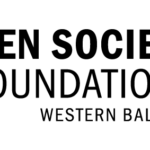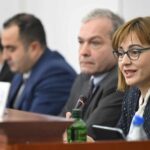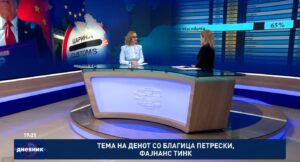
The government announced the ninth package of anti-crisis measures . The planned budget expenditure is 662 million euros, and the goal is to protect the standard of living of citizens, and to support the liquidity of companies and the development of the economy. In addition to this budget, 3 systemic measures have been set aside to increase the salaries of public sector employees and pensions, with a total value for 2023 and 2024 of 516 million euros.
Finance Think believes that this package of anti-crisis measures has a strengthened component of targeting citizens, households and companies that are vulnerable or have a justified need for current and structural support. However, certain measures in terms of their scope, as well as certain measures that are not directly related to the crisis but help with regard to its consequences, have been adopted at a time when the country is entering an election cycle and at a time when inflation expectations remain elevated. In that sense, we estimate that such measures carry significant risks.
In the following, we elaborate and analyze quantitatively this FT Opinion.
In terms of volume, the latest anti-crisis package is similar to the previous one (for 2022), which amounted to 760 million euros [1]. However, the severity of the crisis and the stage the economy was in in 2022 compared to today are drastically different. During 2022, the energy crisis had its peak, as a result of the record prices of primary food and energy products. While, today, the price of energy and food products in the global markets has stabilized or decreased, and the domestic supply of electricity has increased. Therefore, if last year we had an acute situation and there was a real justification for an extensive package of anti-crisis measures, this year we are in the exit phase of the crisis. Hence, the total planned budget is inadequate to the current need. At the same time, although the package is called anti-crisis, the measures also include goals that are not directly related to the crisis, which may cause a wrong perception, especially considering that the country is entering a pre-election period. In that regard, the key recommendation is that instead of a constant crisis focus, at this stage it should be shifted to building resilience and sustainability of the economy.
Out of a total of 26 measures, 13 follow on from the measures announced in 2022, of which six are characterized as anti-crisis measures, and the remaining seven as measures that contribute to mitigating the effects of the crisis, but existed or probably would have existed even if there was no crisis. Then, six are new measures that provide temporary support to the income of vulnerable categories of citizens and, hence, have the character of new anti-crisis measures; while the remaining four are new measures that are not directly related to the crisis (Table 1). It is noticeable that, at least for the measures directly related to the crisis, the individual budgets have been reduced compared to the previous package, which is largely due to the gradual abandonment of linear measures at the expense of targeted measures, which was a former recommendation from Finance Think (eg see Policy Brief No. 65: What is the transmission of international food prices to the domestic economy? ), but also a condition the country undertook to acquire the Prudential and Liquidity Arrangement from the International Monetary Fund earlier this year.
Table 1. Package of government measures from November 2023
| Previous anti-crisis packages | New anti-crisis package | |
| Measures that build on the measures announced in 2022 | ||
| Subsidizing the price of electricity on a regulated market | 222.7 million euros | 35 million euros |
| Subsidizing the price of heat energy | 17.4 million euros | 7.4 million euros |
| Energy poverty program for GMP beneficiaries and social pension recipients | 40 million euros | 5.9 million euros |
| Financial support for energy poverty through advertisement (ME) | ~1 million euros | 1 million euros |
| Financial support to the most vulnerable categories of citizens | 8 million euros | 2.7 million euros |
| Financial support to recipients of a lower pension | 12.2 million euros | 35 million euros |
| Favorable loans for increasing energy efficiency of municipalities | 10.5 million euros | 10 million euros |
| Supporting households for investments in renewable sources and energy efficiency | ~1 million euros | 1.1 million euros |
| Favorable loans for small and medium-sized enterprises for investments in energy efficiency and renewable energy projects | 10 million euros | 10 million euros |
| Favorable credit line for green transition in cooperation with EIB | 100 million euros | 100 million euros |
| Green financing to SMEs and households for investments in renewable energy sources and energy efficiency | 45 million euros | 790,000 euros |
| Expansion of the range of companies benefiting from the guarantee scheme from the Guarantee Fund of Development Bank | 15 million euros | 39 million euros |
| MyVAT | / | 42.2 million euros |
| New anti-crisis measures | ||
| Financial support for salary increases in the private sector in the range of 3,000 – 9,000 denars | / | Fiscal revenue lost on contribution basis (not estimated) |
| Financial support for students in primary and secondary education | / | 14.3 million euros |
| Student transport vouchers | / | 2 million euros |
| Limitation of default interest to the amount of the debt | / | / |
| Reduction of the penalty interest rate by 3 p.p. for low-income citizens | / | / |
| Reduction in the price of milk and milk products | / | / |
| New measures not directly related to the current crisis | ||
| Advance payment of subsidies to 40,000 farmers (IPARD) | / | 8.1 million euros |
| Favorable credit line to support female entrepreneurship, digitization and projects with a positive contribution to the environment, in cooperation with the French Development Agency | / | 50 million euros |
| Favorable loans for small and medium-sized enterprises, creation and preservation of jobs, support of female entrepreneurship and green investments, in cooperation with the Development Bank of the Council of Europe | / | 50 million euros |
| Fund for energy efficiency for the private and public sector, in cooperation with the World Bank | / | 5 million euros |
Source: Finance Think assessment based on vlada.mk announcements
From the aspect of the structure, the support only for households occupies 17% of the total budget (not including subsidies for the price of electricity and heat), while for companies it amounts to 74% (Table 2). However, support for households in 2023/24 has increased , again due to a strengthening of the targeted component of the package. The targeted measures in the new anti-crisis package for the categories of citizens: pupils, students and pensioners who are vulnerable are justified. The total planned budget for these measures is 70.1 million euros and their participation in the total package is 10.5%.
The total planned budget for companies has increased three times. However, half of the measures include favorable credit lines to support companies in the amount of 249.8 million euros or 37.7% of the budget. These credit lines are mostly provided by the Development Bank or in cooperation with international financial institutions (EBRD, EIB, Development Bank of the Council of Europe, World Bank and the French Development Agency).
One of the key measures for the companies, and indirectly for the employees, is the measure for subsidizing the contributions to increase the salaries of the workers in the range from 3,000 to 9,000 denars. Finance Think indicates that this measure carries risks of manipulation of the basic salary , which will be taken as a comparative basis for salary increases. At the same time, it is necessary to take months for which salaries have already been paid as a basis for comparison, that is, they would be the months of August, September and October 2023.
Table 2. Packages of government measures in 2022 and 2023/24
| Previous anti-crisis packages | New anti-crisis package | |
| Support for households and farmers | 80 million euros | 112.3 million euros |
| Support for companies | 155.8 million euros | 492 million euros |
| Support for companies and households | 385.1 million euros* | 42.4 million euros* |
| Public sector support | 14.9 million euros | 14.9 million euros |
| Systemic measures to mitigate the effects of the price and energy crisis | / | 516.2 million euros |
* The category of measures for companies and households also includes subsidies for electricity and heat energy
Source: Finance Think calculations according to vlada.mk announcements.
In addition to the package of anti- treasury measures, “systemic measures to mitigate the effects of the price and energy crisis” were additionally announced for 2023 and 2024, in the amount of 516 million euros. These measures consist of increasing and adjusting pensions and salaries in the public sector. 278 million euros are planned for increased pensions for over 338,000 pensioners (100 million euros for increase and 178 million euros for compliance with the new methodology). As in FT Paragraph no. 59 on pensions and the situation with the Pension and Disability Insurance Fund from August 2023, Finance Think indicates that the increase in pensions that is greater than the legal framework for harmonization puts at risk the trend of stabilization of the pension system and long-term self-sustainability .
For salaries in the public sector, funds are provided for a 10% increase in accordance with the General Collective Agreement and for vacation pay (52 million denars), as well as for a salary increase in 2024 of 150 million euros. Although these measures are important to support the living standards of the recipients, their careless implementation is contrary to the process of stabilization of inflationary expectations and may have an inflationary effect, thereby reducing the efforts of policy makers to achieve a low and sustainable inflation rate sooner. . Additionally, these measures are being promoted at a time when the country is entering an election cycle.
[1] So far, no specific anti-crisis package was announced for 2023, but during the year the Government continued subsidizing electricity and heat bills and provided a 100 million euro loan to support ESM. In addition, in the second half of the year, the freezing of the prices of basic food products was extended.





